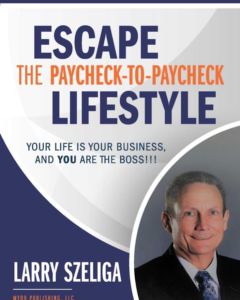
The Title of Your Book
Why did you write Escape the Paycheck-to-Paycheck Lifestyle?

When I retired in 2019, I started helping a few family members and friends take control of their financial situations. Before long, I was helping family members and friends of family members and friends. I was shocked by the level of financial illiteracy I encountered. A friend suggested I “write a book” to teach others how to achieve financial health and maintain it. “Escape the Paycheck-to-Paycheck Lifestyle” focuses on action, not theory. It gives readers practical tools and templates to use in making better financial decisions. It teaches them how mindset and perseverance can impact financial well-being. It provides step-by-step instructions on collecting and analyzing information needed to make good money management decisions and puts them in control. It shows them how to increase their income and decrease expenses. Readers will learn what to do, how to do it, and understand why they’re doing it. They’ll apply fictitious examples in the book to their circumstances for a successful financial playbook that they can reference for years. I firmly believe that your life is your business, and you are the boss. People are the source of enormous, untapped potential, and my goal is to help them unlock that potential.
What was your biggest surprise or aha moment when writing your book?
Who is your ideal audience for the book?
Tell us, how do you deal with fear?
Tell us, how do you deal with rejection?
Tell us two concepts or ideas you want the reader to takeaway?
What’s a personal self-talk, mantra, affirmation, or self-belief that contributes to your success?
1. “My life is my business, and I am the boss!” 2. “I will not make excuses, I will make it happen!”
Contact Larry Szeliga:
www.MYOBPublishing.com









